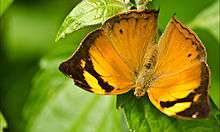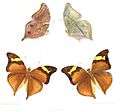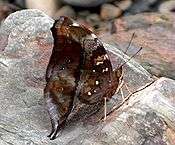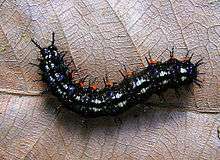Doleschallia bisaltide
This article is about the species. For the subfamily, see Charaxinae.
| Autumn leaf | |
|---|---|
_Bali_I.jpg) | |
| Ventral view Bali, Indonesia | |
 | |
| Dorsal view | |
| Scientific classification | |
| Kingdom: | Animalia |
| Phylum: | Arthropoda |
| Class: | Insecta |
| Order: | Lepidoptera |
| Family: | Nymphalidae |
| Genus: | Doleschallia |
| Species: | D. bisaltide |
| Binomial name | |
| Doleschallia bisaltide (Cramer, 1777) | |
| Subspecies | |
|
See text | |
Doleschallia bisaltide, commonly known as the autumn leaf, is a nymphalid butterfly found in South Asia, Southeast Asia, and Australasia. In Australia they are also known as leafwing.
Description
_pupa_on_Graptophyllum_pictum_(Mindanao%2C_Philippines).jpg)
D. bisaltide pupa
The larvae are black, with two rows of dorsal white spots. Head with a pair of branched spines; rest of the segments with a dorsal and a lateral row of blue branched spines on each side. They feed on Artocarpus, Pseuderanthemum, Calycanthus, Ruellia, Girardina, Strobilanthus and Graptophyllum.[1][2] The pupae are yellowish with numerous black spots; constricted in the middle; head produced into two points.[3] There are several subspecies under Doleschallia bisaltide:[4]
- Doleschallia bisaltide andamanensis Fruhstorfer, 1899
- The Andaman autumn leaf closely resembles the Indian form, but differs in the oblique yellow band on the upperside of the forewing, which is broader and extends from the middle of the costal margin uninterruptedly to interspace 4, though it is preapically constricted. On the upperside of the hindwing there is an inner as well as an outer conspicuous subterminal narrow-black band. On the underside this subspecies is as variable as the typical form, but the ground colour in many specimens (presumably wet-season broods) is of a richer, almost metallic green, with the basal snow-white spots defined with black lines; the ocelli in interspaces 2 and 5 seem also to be more clearly defined than in the Indian form. Antennae, head, thorax and abdomen as in malabarica.[5]
- This subspecies has been seen in the South Andaman (Chidiyatapu), Car Nicobar, Central Nicobars and at Great Nicobar. They are attracted to the flowers of Ligustrum glomeratum and larvae have been discovered on Pseuderanthemum album (Acanthaceae).[6]
- Doleschallia bisaltide apameia Fruhstorfer, 1912
- Found in the Obi Islands.
- Doleschallia bisaltide australis C. & R. Felder, 1867
- The leafwing. Found in Indonesia, Torres Strait Islands, and northeastern Australia.[7]
- Doleschallia bisaltide bougainvillensis Strand, 1920
- Found in Bougainville.
- Doleschallia bisaltide cethega Fruhstorfer, 1912
- Found in Sulawesi.
- Doleschallia bisaltide ceylonica Fruhstorfer, 1903
- The Ceylon autumn leaf. Found in Sri Lanka.
- Doleschallia bisaltide continentalis Fruhstorfer, 1899
- Doleschallia bisaltide denisi Viette, 1950
- Found in New Caledonia and the Loyalty Islands.
- Doleschallia bisaltide gurelca Grose-Smith & Kirby, 1893
- Found in the Bismarck Archipelago and the Admiralty Islands
- Doleschallia bisaltide herrichi Butler, 1876
- Found in New Hebrides.
- Doleschallia bisaltide indicaMoore, 1899
- Doleschallia bisaltide karabachica Tytler, 1940
- Doleschallia bisaltide malabarica Fruhstorfer, 1899
- The Malabar autumn leaf. Males and females underside yellowish brown, paling anteriorly to rich golden yellow on the forewing, shading anteriorly into dusky brown on the hindwing. Forewing: the apical half black, following a line from vein 12 opposite the Discocellulars, passing through apex of cell, obliquely across middle of interspace 3 and curving down to tornus; a black spot near apex of cell coalescing with the inner margin of 1he black colour; a short, very oblique, broad golden-yellow band, broader in the female than in the male, from middle of costal margin to interspace 5; a spot beyond in line with it in interspace 4; two, sometimes three, minute, preapical white specks; the cilia fulvous, touched with white, anteriorly. Hindwing uniform; the costal margin broadly as noted above, a subterminal narrow band and narrower terminal line posteriorly, dusky black; a postdiscal black spot in interspaces 2 and 5 respectively; the cilia fulvous.
- Underside very variable, closely resembling a dry leaf. No two specimens are ever alike. The ground colour varies from reddish to dark greenish brown with irrorations of greyish and black scales; apex of the forewing and the terminal margin posteriorly of the hindwing more or less lilacine; forewings and hindwings crossed by a dark narrow discal fascia, generally bordered on the inner side by a greyish line; this fascia bent inwards at right angles above vein 6 of the forewing and in most specimens, bordered internally by a diffuse pale patch and externally by an oblique whitish mark, beyond which is a subcostal white spot, followed by a transverse sinuous postdiscal series of obscure ocelli crossing both wings, each ocellus centred by a minute dot, white on the fore, black on the hindwing. In the male there are generally, but not invariably, a number of whitish spots on the basal areas of both wings. Antennae blackish brown, ochraceous at apex; head, thorax and abdomen dark fulvous brown; beneath, the palpi white, the thorax and abdomen pale brown.[5] Wingspan is about 84 to 88 mm (3.3 to 3.5 in). Found from Sikkim, S. India, Ceylon, Assam, Myanmar and Tenasserim.
- Doleschallia bisaltide menexema Fruhstorfer, 1912
- Found in the Treasury Islands, Shortlands, Guadalcanal, and possibly the Solomon Islands.
- Doleschallia bisaltide merguiana Evans, 1924
- Doleschallia bisaltide montrouzieri Butler, 1876
- Found in New Hebrides.
- Doleschallia bisaltide nasica Fruhstorfer, 1907
- Found in Waigeu.
- Doleschallia bisaltide nigromarginata Joicey & Noakes, 1915
- Found in Biak.
- Doleschallia bisaltide tualensis Fruhstorfer, 1899
- Found in Kai Island
_larva_on_Graptophyllum_pictum_(Mindanao%2C_Philippines).jpg)
D. b. philippensis fifth instar larva on Graptophyllum pictum
- Doleschallia bisaltide philippensis Fruhstorfer, 1899
- Found in the Philippines.
- Doleschallia bisaltide pratipa C. & R. Felder, 1860
- Doleschallia bisaltide rennellensis Howarth, 1962
- Found in Rennell and the Bellona Islands.
- Doleschallia bisaltide scapus Fruhstorfer, 1912
- Doleschallia bisaltide sciron Godman & Salvin, 1888
- Found in the Treasury Islands, Shortlands, and Guadalcanal.
- Doleschallia bisaltide tenimberensis Fruhstorfer, 1912
- Found in Biak.
- Doleschallia bisaltide tualensis Fruhstorfer, 1899
- Found in Kai Island
Gallery
 Doleschallia bisaltide indica
Doleschallia bisaltide indica Doleschallia bisaltide andamanensis
Doleschallia bisaltide andamanensis_at_the_London_Butterfly_Centre.jpg) Ventral wing views of Doleschallia bisaltide are highly variable - example of weaker contrast
Ventral wing views of Doleschallia bisaltide are highly variable - example of weaker contrast Stronger ventral contrast example
Stronger ventral contrast example.jpg) Doleschallia bisaltide malabarica from Koovery
Doleschallia bisaltide malabarica from Koovery
 Doleschallia bisaltide indica from Buxa Tiger Reserve
Doleschallia bisaltide indica from Buxa Tiger Reserve_imago_emerging_on_Graptophyllum_pictum_(Mindanao%2C_Philippines)_2.jpg)
_on_Rosa_chinensis_(Mindanao%2C_Philippines).jpg) Dorsal wing pattern of Doleschallia bisaltide philippensis
Dorsal wing pattern of Doleschallia bisaltide philippensis
References
- 1 2 Les Day. "Doleschallia bisaltide". Samui Butterflies. Retrieved August 7, 2012.
- ↑ Adrian Hoskins. "Autumn Leaf". Learn About Butterflies. Retrieved August 7, 2012.
- ↑ Described from figure in Jour. Bomb. N. H. Soc.
- ↑ Markku Savela. "Doleschallia C. & R. Felder, 1860". Lepidoptera and some other life forms. Retrieved August 7, 2012.
- 1 2 Bingham, C.T. (1905). The Fauna of British India, Including Ceylon and Burma Butterflies. 1 (1st ed.). London: Taylor and Francis, Ltd.
- ↑ Veenakumari, K. and Prashanth Mohanraj 1997. Rediscovery of Lethe europa tamuna with notes on other threatened butterflies from the Andamans and Nicobar Islands. Journal of the Lepidopterists' Society. 51(3):273-275 PDF
- 1 2 "Doleschallia bisaltide australis (Autumn Leaf)". Butterfly Circle. Retrieved August 7, 2012.
- ↑ "Doleschallia bisaltide continentalis Fruhstorfer,1899". Retrieved August 7, 2012.
External links
| Wikimedia Commons has media related to Doleschallia bisaltide. |
| Wikispecies has information related to: Doleschallia bisaltide |
This article is issued from Wikipedia - version of the 11/15/2016. The text is available under the Creative Commons Attribution/Share Alike but additional terms may apply for the media files.
